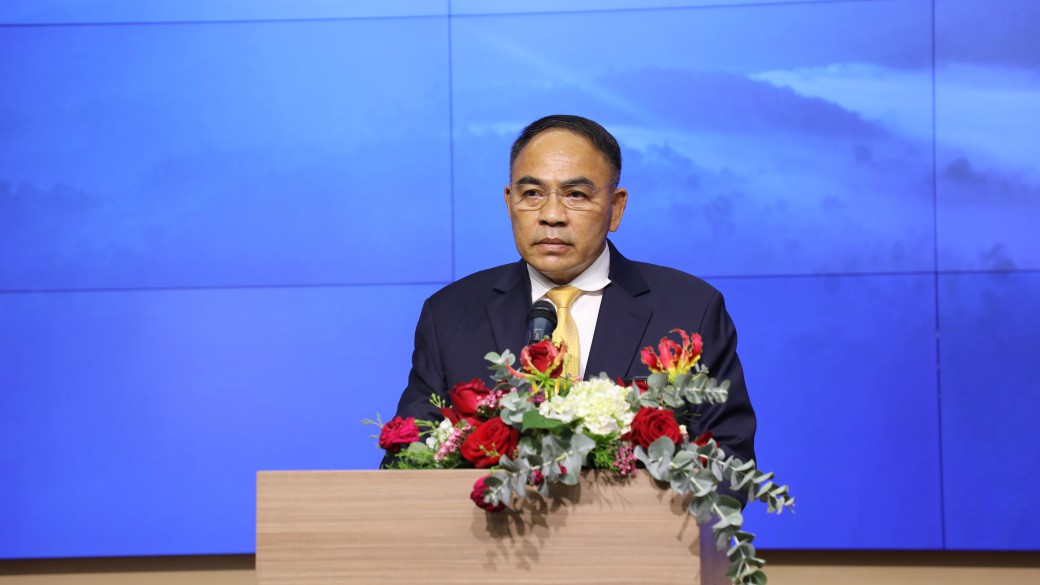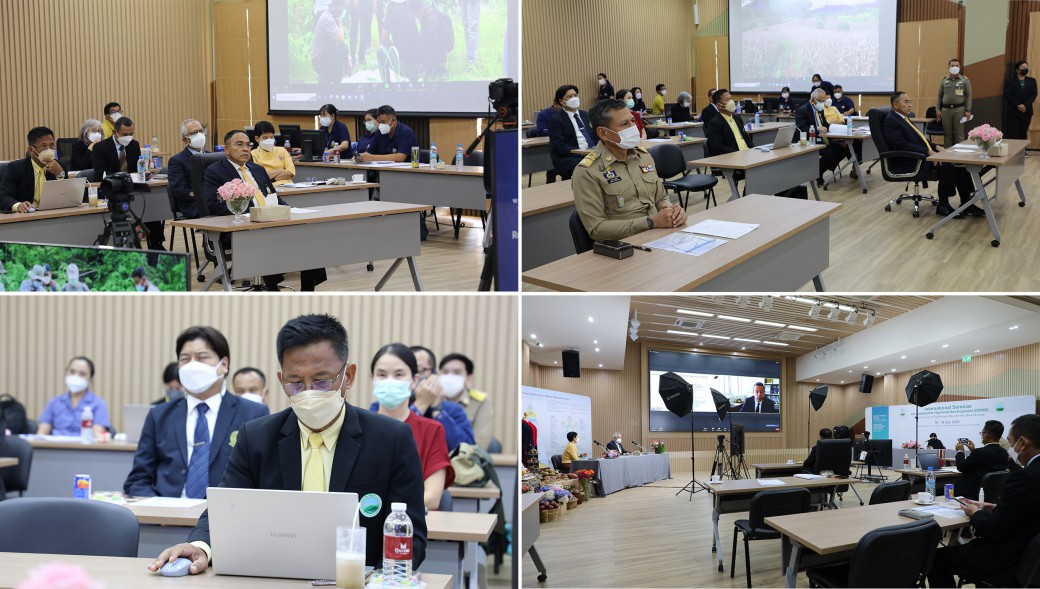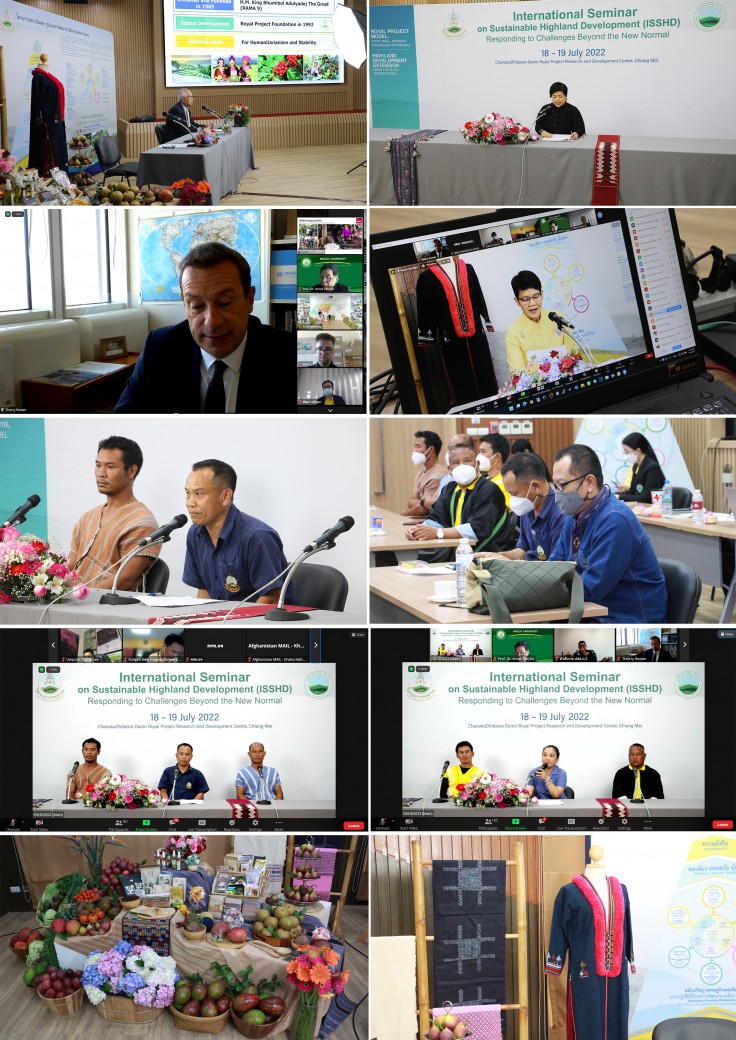International Seminar on Sustainable Highland Development


General Kampanath Ruddith, Privy Councilor Opening speech of the international seminar
Date 18 July 2022 at the Royal Project Agricultural Research and Development Center meeting room Chanakathibhetsorndhamri
Mr. Thierry Rostan, Chief of Sustainable Livelihoods Unit, United Nations Office on Drugs and Crime, Vienna
Distinguished panelists,
Excellencies,
Ladies and Gentlemen,
It is my great pleasure to welcome all of you to this important event on Sustainable Highland Development: Responding to Challenges Beyond the New Normal. The Royal Project Foundation could not be more pleased to organize this event with the Highland Research and Development Institute.
At the outset, let me offer my sincere thanks to all the distinguished panelists. I also would like to welcome Mr. Thierry Rostan, Chief of Sustainable Livelihoods Unit, UNODC, Vienna. Thank you very much for spending your time to share your rich experiences with us.
I am confident this seminar will offer floors for key stakeholders, namely public sector, international organization and civil society, to have dynamic discussions. Learning from similar and diverse lenses can best shed lights on our individual and collective efforts to ensure sustainable development for all.
Ladies and Gentlemen: Since His Majesty King Bhumibol Adulyadej The Great graciously established the Royal Project in 1969 over the past five decades, Thai highlanders have continued to be blessed with His Majesty King Maha Vajiralongkorn Phra Vajiraklaochaoyuhua’s benevolence in nurturing, conserving and extending the Royal Project. The Royal Project itself has achieved the highest success in the development of the Thai highland communities towards sustainability in all dimensions. Its research studies have accumulated a wealth of knowledge including new plant and animal species as an alternative to opium cultivation that can be used for highland development. The farmers in the Royal Project and the extension operational areas have completely stopped growing opium poppies. They have turned to alternative income generating-activities under environmentally-friendly manner, producing safe food according to food safety standards. Accordingly, t are able to earn sufficient income, have food security and basic infrastructure needed. Presently, the vulnerable in the highlands have a better life.

Today in this speedy VUCA world has revealed even more challenges, including COVID-19, climate change, global food crisis, as well as ageing society and digital transformation. The disadvantaged groups of people on the highlands with limited resilience suffer most directly from these circumstances, requiring attention and assistance from the Royal Project under the New Normal way of life.
Successful case studies are selected to be presented in the seminar as concrete examples of the transformation from opium poppy cultivation and shifting practice to environmentally-friendly farming, using available resources at the utmost benefits according to the Royal Project Model. The holistic development approach is implemented, stressing BCG model, covering bio-circular-green economy, in line with the Sustainable Development Goals. It can be replicated by other areas within the country and beyond.
Since the majority of highland population are farmers who rely on natural resources, it is important to increase their awareness about the importance of natural resources conservation. The Royal Project strategy has focused on environmental dimension by encouraging local people participation in resource management as an important mechanism to ensure environmentally sustainable development. Successfully started with the Clean Village Project, the Royal Project has carried out the Sustainable Low-Carbon Highland Community Development aiming at reducing greenhouse gas emissions. Along with the effort is the promotion of sufficiency economy for the optimal use of limited available resources in the region. The communities have been encouraged to practice environmentally-friendly agriculture, participate in forest restoration and conservation, improve community health management and strengthen individuals and communities to cope with changes.
At present, 39 Royal Project Research and Development Centers serve as learning centers on sustainable development following the Royal Project Model in various aspects. Each year, about 500,000 people including academics, students, interesting people and especially farmers both domestic and international visit and learn from the centers.
Highland Research and Development Institute (Public Organization) or HRDI is the main agency to extend the Royal Project Model to other highland areas throughout the kingdom. HRDI has driven towards inclusive development to ensure the majority of highland people have a better quality of life under the Leave No One Behind Principle. HRDI has also disseminated the Royal Project approaches at the international level as a prototype for other countries in different regions. It is an alternative pathway for poverty reduction, leading towards self-reliance, food safety, natural resources and environment conservation with local participation and integration across all stakeholders.
The Royal Project Model has adhered to the principle of "understanding, empathizing and development" following the Sufficiency Economy Philosophy. Not only has it focused on economic development, but it also has enhanced social and environmental development in a balanced manner. People can live in harmony with nature in a stable and sustainable way. The Model has boosted the competitiveness for the disadvantaged in remote and faraway highland contexts through the richness of biodiversity and culture. Consequently, all concerned have witnessed economic growth, community income diversification, inequality reduction and community strengths, fostering the achievement of the Sustainable Development Goals.
At the end of the day, no man is an island and no one country survives the global crisis alone. The Royal Project hopes to share our lessons learned and experiences with friends across the nations. We do so in the belief that other countries can also make meaningful investments and policy choices for their people and for the entire world.
Once again, I thank the Organizing Working Group for facilitating this seminar. I wish you fruitful deliberations and declare that the seminar is open. Thank you.


